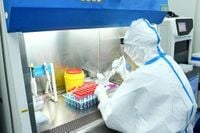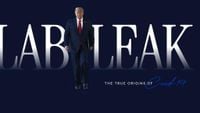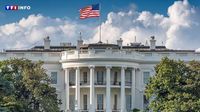On April 18, 2025, the White House website underwent a significant update, promoting the controversial theory that COVID-19 originated from a lab leak. This revision marks a stark shift in narrative, as the site now features an image of former President Donald Trump and critiques the pandemic response of the previous administration led by Joe Biden.
The updated page on Covid.gov directly targets Dr. Anthony Fauci, who had previously defended the theory that COVID-19 is of natural origin. The new content lists five arguments supporting the lab leak theory, notably highlighting that the first known cases of the disease emerged in Wuhan, China, where a prominent virology institute conducts research on coronaviruses.
One of the assertions made on the site states, "If there were evidence of a natural origin, it would have already appeared. But that is not the case." This statement reflects a growing sentiment among certain factions in the U.S. that the lab leak theory, once dismissed as a conspiracy, is gaining traction.
U.S. intelligence agencies, including the FBI and the Department of Energy, have begun to support the lab leak theory to varying degrees. In January 2025, the CIA estimated with a low degree of confidence that a research-related origin of the COVID-19 pandemic is more likely than a natural one. This perspective has been met with skepticism, particularly from China, which labeled the theory as "extremely improbable" and accused the U.S. of politicizing the origins of the pandemic.
The White House website not only promotes the lab leak theory but also criticizes the previous administration's pandemic measures, such as mask-wearing and social distancing. In a section titled "disinformation," it accuses the Biden administration of discrediting alternative treatments and colluding with social media platforms to censor dissenting opinions. This criticism aligns with ongoing conservative narratives regarding freedom of speech and the handling of COVID-19 information.
Since the onset of the pandemic, more than one million people have died from COVID-19 in the United States alone. The updated narrative on the White House's website reflects a broader political strategy, as the current administration seeks to distance itself from the failures attributed to its predecessor.
In the context of a major trade war with China, the U.S. government's emphasis on the lab leak theory may also serve as a means to deflect blame and shift public focus. The ongoing tensions between the two nations have intensified discussions about the origins of the virus, with accusations flying back and forth.
Dr. Fauci, who served as the chief medical advisor during the Trump administration, has become a focal point for criticism from various groups, particularly those skeptical of vaccines. The updated website highlights how Fauci's previous work, including the publication "The Proximal Origin of SARS-CoV-2," has been used to undermine the lab leak theory. This paper, published in Nature Medicine in March 2020, concluded that the virus likely has a natural origin.
The White House's promotion of the lab leak theory also includes claims that the virus possesses biological characteristics that do not exist in nature. Furthermore, it asserts that researchers at the Wuhan laboratory exhibited symptoms similar to those of COVID-19 in the fall of 2019, months before the virus was officially identified.
This newly adopted stance by the White House has sparked significant debate among scientists and policymakers. While some experts support further investigation into the lab leak theory, others caution against jumping to conclusions without definitive evidence. The scientific community remains divided, with many still advocating for a thorough examination of natural origins.
As the narrative surrounding COVID-19 continues to evolve, the implications of the White House's position could have lasting effects on public perception and international relations. The lab leak theory's resurgence has already influenced discussions in various political and scientific circles.
In a climate where misinformation thrives, the government's approach to the origins of COVID-19 will likely shape future policies and public trust. The ongoing discourse reflects broader themes of accountability, transparency, and the complexities of navigating a global health crisis.
As the U.S. grapples with the aftermath of the pandemic, the question of how COVID-19 originated remains a contentious topic. The updated White House narrative not only seeks to redefine the conversation but also to hold accountable those perceived as responsible for the pandemic's devastating impact.
In conclusion, the White House's recent pivot towards promoting the lab leak theory represents a significant shift in the narrative surrounding COVID-19. With ongoing debates among scientists and the political ramifications of this stance, the origins of the virus will continue to be scrutinized as the nation moves forward in the wake of the pandemic.



